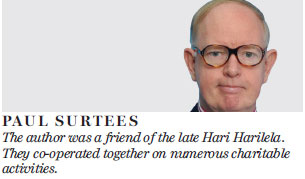Harilela set example to business leaders
Updated: 2015-01-28 07:45
By Paul Surtees(HK Edition)
|
|||||||||
The most famous Indian in Hong Kong, Hari Harilela, recently passed away at 92. While we mourn the passing of this wealthy but compassionate community leader, we can take comfort in celebrating his extraordinary life, several aspects of which could be readily emulated by other Hong Kong tycoons, thereby bringing great benefit to our community and themselves.
In this bustling business city of Hong Kong, which Hari adopted as his home in 1930, he made his way from modest beginnings to become a billionaire. In earlier decades he set up a profitable clothing and tailoring business. Seeking new fields of business, that base was expanded from the late 1950s to include an all-important property portfolio. It was the Harilela Group's hotels, of which they now own 19 - including the Holiday Inn Golden Mile in Tsim Sha Tsui (TST) - that greatly extended the family's wealth.
One reflection of this family wealth was the building long ago of two huge adjoining mansions in Kowloon Tong, one of which alone has forty bedrooms. It is a touching tribute, to both his benign patriarchy and his congenial extended family members, that over 80 of them manage to live harmoniously under that same (admittedly capacious) roof, and that family peace has continued there for decades.
Furthermore, and as something typical of the open-hearted and open-handed man that Hari was, this family residence was opened up to various sectors of the Hong Kong community several times a week, allowing over the years thousands of us to partake of his generous hospitality. How many other Hong Kong tycoons would allow outside groups to hold gatherings in their lavishly appointed private residences?
The following anecdote reflects the measure of the man. Decades ago, I went to see Hari in his modest TST office, asking (on behalf of a charity) that he kindly allow us to hold a gathering in his residence, to which would-be donors to the charity would be invited. I had in mind a modest-scaled cocktail reception for a few dozen lucky guests. However, once he appreciated the good cause for which it was planned, he insisted we arrange not one but two gatherings there. Each catering for 150 guests!
These stylish proceedings would start with a pleasant cocktail reception and be followed by a lavish buffet of some of the most exquisite Indian food. They certainly helped greatly in raising funds for the fortunate charities. All this happened in the enormous, beautifully decorated reception rooms of the family mansion.
Furthermore, the late Hari, his gracious widow Padma and other family members were always there to make their guests feel most welcome. Such memorable and greatly enjoyable evenings were commonplace occurrences there, since Hari, over a period of decades followed a generous policy of sharing his home with many scores of visitors on a weekly basis, coming as they did from a wide range of community organizations.
Hari's was a sought-after voice of advice, and a much-respected one, in the higher echelons of Hong Kong business, diplomatic (he was for a long time the honorary consulate for Niger), governmental and Commonwealth communities; including his own large Indian community.
With all this, if you did not know him personally you might have expected a rather different character. But in fact the most endearing set of characteristics displayed by Hari Harilela was his gracious simplicity, kindly openness; rare modesty and readily-approachable demeanor, treating everyone with equal respect from the hotel doorman to the Chief Executive, several of them his personal friends.
Such a humble approach to others, notwithstanding his vast wealth, social status and influence, is itself a rarity among our leading tycoons: Many of whom could learn a thing or two from Hari about the behavior - a true gentleman.
Hari was a generous benefactor to numerous good causes. For example, several of Hong Kong's universities now house academic buildings which he kindly sponsored, including the Hong Kong Baptist University and the Hong Kong University of Science and Technology. That is not all: His great generosity to all manner of charitable, educational and cultural causes in Hong Kong and beyond was wide in scope and variety. He was blind to any prejudice or cultural bias, and played no favoritism games to ensure insofar as was possible, no deserving need went unmet. Let us hope his legacy of compassion, generosity and kindness will not dissolve with his departure.

(HK Edition 01/28/2015 page1)